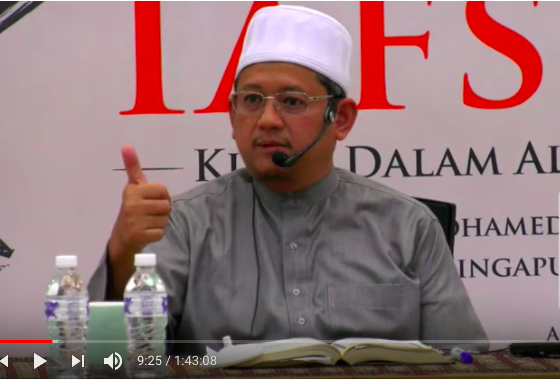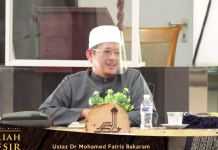This article is a summary of takeaways from Ustaz Dr Mohamed Fatris Bakaram’s Tafsir Lecture at Darul Makmur Mosque on 09th February 2020. Summaries of previous lectures on Surah Taha can be found here.
The First Eight Verses of Surah Taha
Q: You mentioned during last week’s session that the first eight verses of Surah Taha can be used as a means of strengthening our hearts and faith, especially during times of difficulty. I’m going through a very difficult period in my life, how do I put these verses into practice in order to fully benefit from them?
A: Firstly, I would like to make it clear that this practice is not based on any particular hadith of the Prophet SAW. As such, there is no proper method to benefit from these verses (i.e. there’s no specific number of times you need to recite them, or a “best time and place” where its recitation is more encouraged).
What is important is that when you recite them repeatedly, you internalise the meaning of these verses. When you reflect on the interpretation of these verses, it will increase you in your faith. Let us do a brief recap of the meaning of the verses.
1: “Taha” – The meaning of this word is known by Allah alone. Likewise, for whatever situations that we encounter, know that only Allah knows all things. Surrender all that you know and all that you don’t know to Allah. He is Al-Ghaib (The Unknown). Do not ever doubt or think negatively of whatever Allah has given you. Have confidence in Allah’s knowledge. Even if you do not know or understand the wisdom behind whatever is happening to you, remember that Allah’s plans are a mystery- the answers are only with Him. Trust Him to give you what is best for you.
2: “We have not sent down the Qur’an unto you (O Muhammad) to cause you distress,” – Remember that as Muslims, we have been gifted with the Qur’an. It was not sent for us to suffer. Rather, the Qur’an was sent as a way out of suffering for us. In Surah Al-Isra’, Allah declares, “We reveal the Quran which is a cure and mercy for the believers”. Hold onto the Qur’an firmly and seek help confidently from Allah through it.
3: “But only as a Reminder to those who fear (Allah).” – Life is filled with fear and uncertainty. Recite this verse with gratitude, knowing that Allah gives us constant reminders to guide us and in order that we may never forget. Make du’a to Allah, complaining to Him of the fear we have in our hearts, seeking ease and comfort from Him.
4: “a revelation from the One who created the Earth and the high heaven,” – The Qur’an was sent by none other than the Creator of the heaven and the earth. We as human beings are also creations of Allah SWT. We were created to be tested by Him. Only He alone can give us the solutions to these tests.
5: “Ar-Rahmaan (the Most Compassionate), (Who is) established on the Throne.” – Regardless of how difficult the trials are, how painful and unfair things may seem, remember that Allah is Ar-Rahmaan. Whatever you are going through is a result of receiving His Mercy. You may be dealing with a difficult loss of a beloved child or spouse. Remember that Allah has been Most Compassionate in giving you the blessing of happiness and love of the beloved one in the first place. Take any tests that Allah gives you in your stride; These are gifts given out of Allah’s Mercy.
6: “To Him belong whatever is in the heavens, and whatever is in the earth, and whatever is between them, and whatever is beneath the ground.” – Allah has full control of all our affairs, He is the supreme authority who reigns over all creation. Whether we are alive and walking on the earth or dead and buried beneath the ground, we belong to Allah alone. Remember that at the end of the day, Inna Lillahi wa inna ilaihi roji’un (Indeed, to Allah we belong and to Allah we shall return). This world is only temporary and whatever that we own is not truly ours to keep.
7: “Whether you speak openly ˹or not˺, He certainly knows what is secret and what is even more hidden.” – Allah knows all things, visible or hidden. Do not worry, Allah knows everything, nothing is hidden from Him. So, confide in Him in seeking for help, for He knows what you are going through and He knows what you need the most.
8: “Allah – there is no god except He. To Him belong the Asma’ul Husna (Beautiful Names).” – There is nobody worthy of worship besides Allah. It is He who is most Powerful and Capable, who is able to take us out of troubles and provide for us from what we need. Seek His help by calling upon, His Asma’ul Husna.
Regardless of the difficulties you are going through, remind yourselves to keep striving by deriving strength through these verses.
We see in the recent events that have unfurled, that when people do not have Allah in their lives, they allow their fear to overcome them. We see people driven to anxiety and greed as a response to fear, wiping out the supermarket shelves out of their own selfishness. In Surah Al-Ma’arij, Allah mentions the state of mankind. He says that mankind has been created “created anxious and impatient”. When in difficulty, they are driven to desperation and distress. However, in times of ease, they are stingy. They do not think of others whether they are in the state of ease or difficulty. True believers are not like this, we trust Allah to pull us out of our fear.
These eight verses of Surah Taha are just one of the many special miracles that Allah gives for us to hold onto. Recite it often. If you find it difficult to do so, then recite surah Al-Ikhlas, for it also has its own powers.
The Story of Prophet Musa AS
وَهَلْ أَتَاكَ حَدِيثُ مُوسَىٰ
And has there come to you the story of Musa (Moses)? [20:09]
إِذْ رَأَىٰ نَارًا فَقَالَ لِأَهْلِهِ امْكُثُوا إِنِّي آنَسْتُ نَارًا لَّعَلِّي آتِيكُم مِّنْهَا بِقَبَسٍ أَوْ أَجِدُ عَلَى النَّارِ هُدًى
When he saw a fire, he said to his family: “Wait! Verily, I have seen a fire, perhaps I can bring you some burning brand therefrom, or find some guidance at the fire.” [20:10]
To understand the context behind this story, I will mention a bit about what will be covered later in Surah Al-Qasas. After having killed a man by accident, Prophet Musa AS had fled Egypt in fear of punishment. He travelled to the distant land of Madyan, 170km away from Tabuk (near Madinah). Here, he met with the daughters of Prophet Shuaib by the river.
Upon seeing the ladies struggle to water their sheep, Prophet Musa AS stepped in to offer them help. As a reward, he was invited to meet Prophet Shuaib and was offered a job in his household for eight years. Prophet Musa AS later on married one of Prophet Shuaib’s daughters.
After ten years of service to Prophet Shuaib, he requested permission to return to Egypt with his wife and young child. Along the way to Egypt, they made a pitstop in the middle of the desert. It was winter, it was dark and cold. It was then that Prophet Musa AS spotted a much-needed fire. He had hoped that the fire would mean there was someone there who could either offer them a bit of the fire for warmth or guidance on their path.
Performing Salah with your footwear on
فَلَمَّا أَتَاهَا نُودِيَ يَا مُوسَىٰ
But when he approached it, he was called, “O Musa! [20:11]
إِنِّي أَنَا رَبُّكَ فَاخْلَعْ نَعْلَيْكَ ۖ إِنَّكَ بِالْوَادِ الْمُقَدَّسِ طُوًى
Verily! I am your Lord! So take off your shoes, you are in the sacred valley, Tuwa. [20:12]
If you remember in a previous lecture, I had mentioned that it is permissible to perform prayers with your footwear on. This verse does not contradict that statement in any way. In this situation, Prophet Musa AS was speaking directly to Allah, in the sacred Tuwa Valley.
I would like to mention that there are certain scholars who hold the opinion that Salah with footwear on is sunnah. So do not be surprised if you find people preferring to pray with their shoes. There is in fact a hadith which says that Muslims should pray with shoes on so that they do not pray like the Jews, who prayed barefooted.
hat being said, we need to look at the situation before deciding whether or not to keep our shoes on during prayer. The Prophet SAW’s mosque back in Madinah used to have sand as the flooring; Back then, Salah wearing footwear made perfect sense. Likewise, when performing jenazah prayers at the void deck, we can choose to do so with shoes on. However, when we perform prayers at home or in the mosque, the floor is carpeted or we lay out our prayer mats. In this situation, it is better to remain barefooted. Islam is simple and practical, do not complicate things.
The Command of Performing Salah
وَأَنَا اخْتَرْتُكَ فَاسْتَمِعْ لِمَا يُوحَىٰ
I have chosen you, so listen to what is revealed: [20:13]
إِنَّنِي أَنَا اللَّهُ لَا إِلَٰهَ إِلَّا أَنَا فَاعْبُدْنِي وَأَقِمِ الصَّلَاةَ لِذِكْرِي
Surely I, I am Allah; There is no god except I; So worship Me, and keep up the prayer for My Remembrance. [20:14]
Allah requests of Prophet Musa AS and us to worship Him. He tells us in this verse that the purpose of prayer is for Allah’s remembrance. In times of difficulty today, one thing we need to hold onto firmly is to remember Allah at all times, so keep up your prayers.
We mentioned previously that the command of Salah had been given along with previous revelations to prophets of the past. For us, the Ummah of Prophet Muhammad SAW, Salah is a series of steps starting with the takbir, followed by the al-Fatihah, the rukuk etc. We do not know how the Salah of the past was like, but we do know that performing Salah has been in practice even in the time of Prophet Musa AS.
We have also mentioned that the word “Salah” may carry the meaning of “Du’a” or Supplication in other verses of the Qur’an. The question is raised of whether, in this verse, Allah was instructing Prophet Musa AS to make supplication rather than to perform Salah. Is it possible to translate this verse as “make Du’a frequently”? We cannot do this. The word ‘Salah’ in this verse follows the word ‘Aqim’ which can be translated to mean ‘stand’ or ‘establish’. The phrase “Aqimi As-Salah” can only be translated as perform your Salah, it does not refer to making supplication.
So in this verse, Allah SWT tells Prophet Musa AS, “Perform Salah so that you remember Me”. There is another interpretation of this verse- it loosely translates to, “Perform Salah because you are remembered by Me.”. What that means is that Prophet Musa is told to perform Salah out of Syukr (gratitude) for Allah SWT’s remembrance of him AS. Allah has given us plenty of blessings, protected us from harm and given us strength in times of fear and difficulty. We are grateful for Him SWT. How do we show that gratitude towards Him? Through Salah.
On The Day of Judgement
إِنَّ السَّاعَةَ آتِيَةٌ أَكَادُ أُخْفِيهَا لِتُجْزَىٰ كُلُّ نَفْسٍ بِمَا تَسْعَىٰ
Verily, the Hour is coming and I will keep it hidden, that every person may be rewarded for that which he strives. [20:15]
The knowledge of the Day of Judgement is with Allah alone. Even the angels and the prophets do not know when it will come. Allah keeps this a secret for a reason. He created us and He knows what we are like.
Imagine if the knowledge of when the Day of Judgement will be is known to all. How would we react? Some people will be in total panic and disarray- there will be chaos. Others will think they have plenty of time and put off doing good until right at the end, before the day itself. If people knew when they were going to die, they would do the same thing. So even our time of deaths (considered a small Qiyamat) are kept secret from us.
Allah wants to keep us on our toes. So that we will always strive to do our best and are always ready to do good, with calm hearts and minds. We don’t know when our lives will end, so that we do our best always.
فَلَا يَصُدَّنَّكَ عَنْهَا مَن لَّا يُؤْمِنُ بِهَا وَاتَّبَعَ هَوَاهُ فَتَرْدَىٰ
Therefore let not him who believes not in it and follows his low desires turn you away from it so that you should perish; [20:16]
We believe in the Day of Judgement, so we hold onto it tightly. We do not get influenced by people who do not believe and who only want to follow their desires.
Summary of Verses 9 to 16
Through these verses, Allah is training Prophet Musa AS in preparation for his impending mission to confront Firaun.
In verse 12, Allah instructs Prophet Musa to remove his shoes, as a sign of respect to the valley and the sacred knowledge that is about to be revealed. Prophet Musa AS was properly set up, in order that he might be in the proper state to receive knowledge. Allah SWT then instructs Prophet Musa AS in verse 13, to listen up and pay attention. He was asked to open up his heart and mind in order listen carefully.
Let us revisit and summarise the instructions given by Allah.
- Know that Allah exists. Hold onto the fundamental truth that Allah is always here, and that there is no god but Him.
- Enslave yourself to Allah. Now that you are aware of His existence, you need to worship Him. Acknowledge His greatness and your weakness as His servant. Follow His orders and avoid whatever displeases Him.
- Perform Salah. The first and most important pillar of worship is our prayers. Salah is simple and easy, it only takes five minutes of our time to perform each prayer, just five times a day. Yet, we find it so burdensome for us, our hearts find it so difficult. Why is this so? This is because our life is filled with distractions. Distractions make us forget Allah. So we need to perform prayers. Each time we perform Salah, we remember Allah and thank Him for remembering us.
- Worship Allah for as long as you live. Life is temporary and death is certain. Death is the smaller of two ‘Qiyamat’s, and when Qiyamat has arrived, there is no turning back. So strive your best to earn as much as you can, while you still have the chance.
- Beware of distractions along the way. There will be people who do not believe in the Day of Judgement. These people will try to steer you away from the right path. Stay firm and focused so that you do not lose hope or get influenced by them.
May Allah protect us from all difficulty and anxiety. May He keep our family, friends and loved ones under His Loving Protection. May He grant us a solution and a way out of this difficult time. Ameen. Take care everyone.
Summary by: Arina Adom
Arina Adom is a lover of learning who takes on the world with an open mind. Resourceful and adaptable, always ready to take on new challenges. Comfortable working with diverse groups of people, yet able to work independently. Thrives under pressure. Currently seeking a meaningful career that enables me to impact lives directly and bring about positive changes in the lives of others in the community.
Arina graduated with a degree in Science ( Hons ), Life Science from NUS and is currently a Research Assistant at Evolutionary Biology Lab ( NUS ). She is currently taking a diploma in Quran and Sunnah Studies from Al Zuhri.
Watch Mufti’s Kuliah Tafsir again at
MUSLIM SG Youtube
Watch and follow MUFTI classes weekly
every Sunday after solat Maghrib
organised Masjid Darul Makmur & Muslim.SG.
Your contributions are appreciated.Get more details by clicking the image below.











